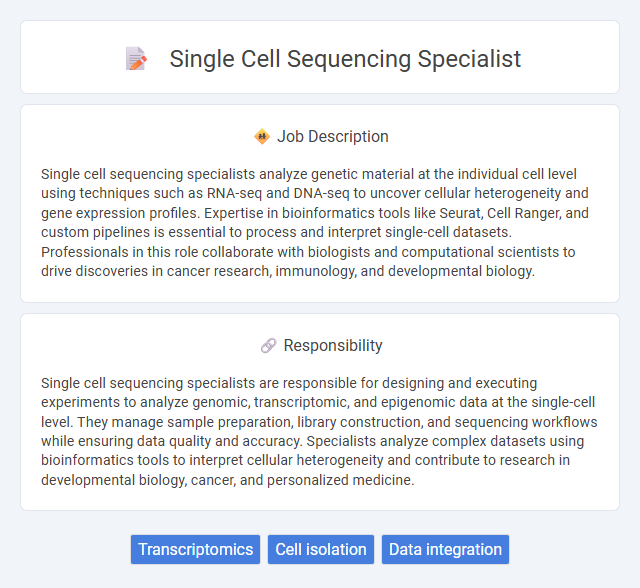
Single cell sequencing specialists analyze genetic material at the individual cell level using techniques such as RNA-seq and DNA-seq to uncover cellular heterogeneity and gene expression profiles. Expertise in bioinformatics tools like Seurat, Cell Ranger, and custom pipelines is essential to process and interpret single-cell datasets. Professionals in this role collaborate with biologists and computational scientists to drive discoveries in cancer research, immunology, and developmental biology.
Individuals with a strong background in molecular biology, bioinformatics, and a passion for cutting-edge technology are likely to be well-suited for a Single Cell Sequencing Specialist role. Those comfortable with complex data analysis and meticulous lab work may find the job challenging yet rewarding, while candidates lacking attention to detail or interest in genomics might struggle to thrive. The probability of success increases for detail-oriented individuals who enjoy problem-solving and continuous learning in a fast-evolving scientific field.
Qualification
Expertise in molecular biology and genomics is essential for a Single Cell Sequencing Specialist, with proficiency in techniques such as scRNA-seq, ATAC-seq, and DNA/RNA library preparation. Strong background in bioinformatics and data analysis software like Cell Ranger, Seurat, or Scanpy is crucial for interpreting complex single-cell datasets. Candidates typically hold advanced degrees (MSc, PhD) in biology, biotechnology, or related fields, complemented by hands-on experience in next-generation sequencing technologies.
Responsibility
Single cell sequencing specialists are responsible for designing and executing experiments to analyze genomic, transcriptomic, and epigenomic data at the single-cell level. They manage sample preparation, library construction, and sequencing workflows while ensuring data quality and accuracy. Specialists analyze complex datasets using bioinformatics tools to interpret cellular heterogeneity and contribute to research in developmental biology, cancer, and personalized medicine.
Benefit
Specialists in single cell sequencing likely gain access to cutting-edge technology that enhances their research capabilities and career growth. They probably benefit from working in interdisciplinary teams, fostering collaboration and innovation in biomedical studies. High demand for their expertise may translate into competitive salaries and diverse job opportunities in academia, biotechnology, and pharmaceuticals.
Challenge
Single cell sequencing specialists likely face challenges in managing the vast complexity and heterogeneity of individual cells, which requires advanced analytical skills and cutting-edge technology. The probability of encountering difficulty increases when interpreting high-dimensional data and integrating multi-omics approaches to derive meaningful biological insights. Adapting to rapidly evolving sequencing techniques and bioinformatics tools may also pose ongoing challenges in this specialized field.
Career Advancement
Single cell sequencing specialists are in high demand for their expertise in isolating and analyzing individual cellular data, which is pivotal for advancing personalized medicine and genomics research. Career advancement opportunities include leading advanced research projects, developing innovative sequencing protocols, and transitioning into bioinformatics or data science roles that support large-scale genomic data interpretation. Mastery of cutting-edge technologies like droplet-based sequencing and expertise in computational biology significantly enhance prospects for senior scientist or managerial positions within biotech and pharmaceutical industries.
Key Terms
Transcriptomics
Single cell sequencing specialists with expertise in transcriptomics analyze gene expression profiles at the individual cell level to uncover cellular heterogeneity and functional states within complex tissues. Proficiency in platforms such as 10x Genomics Chromium, Smart-seq, and Drop-seq is essential for isolating and sequencing RNA transcripts from thousands of single cells simultaneously. Expertise in bioinformatics tools like Seurat, Scanpy, and Cell Ranger enables accurate data processing, clustering, and interpretation of transcriptomic datasets to support cutting-edge research in developmental biology, immunology, and cancer genomics.
Cell isolation
Single cell sequencing specialists utilize advanced cell isolation techniques such as fluorescence-activated cell sorting (FACS), microfluidics, and laser capture microdissection to obtain pure populations of individual cells for genomic analysis. Expertise in optimizing protocols for cell viability and minimizing contamination is critical to ensure high-quality sequencing data. Proficiency in isolating rare or fragile cell types enhances the precision of transcriptomic and epigenomic profiling in diverse biological samples.
Data integration
A Single Cell Sequencing Specialist skilled in data integration utilizes advanced bioinformatics tools to merge diverse single-cell datasets, enhancing the resolution of cellular heterogeneity. Expertise in algorithms for batch effect correction and multimodal data alignment enables comprehensive analysis of genomics, transcriptomics, and epigenomics at the single-cell level. This integration supports precise biomarker discovery and accelerates translational research in personalized medicine.
 kuljobs.com
kuljobs.com